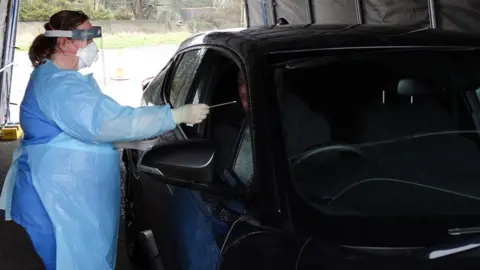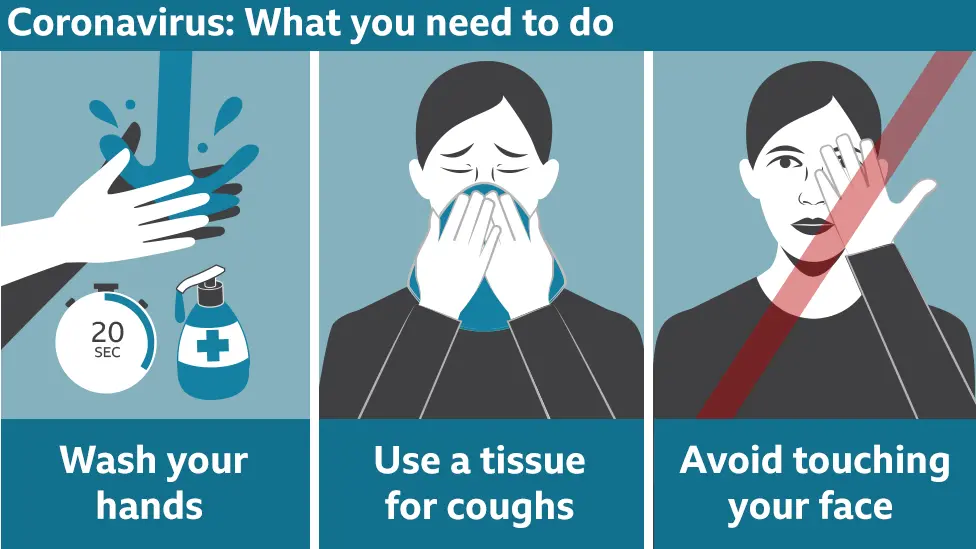Coronavirus: Why is Wales reducing testing?
 Swansea Bay HB
Swansea Bay HBThe Welsh Government has defended its decision to restrict coronavirus screening to the most symptomatic.
Three drive-through community testing units in north Wales have been closed as the UK moves into the "delay phase" of its response to the pandemic.
Plaid Cymru leader Adam Price has called on the Welsh Government to increase surveillance testing.
The Welsh Government said the policy would give the health service "the greater capacity it needs".
World Health Organisation (WHO) guidance calls on national governments to "rapidly detect Covid-19 and any evidence of human-to-human transmission among contacts", including testing "all confirmed cases and their contacts".
Betsi Cadwaladr University Health Board confirmed three drive-through testing centres at Rossett near Wrexham, Llanfairfechan in Conwy and Porthmadog, Gwynedd, are no longer operating.
"This is part of a national decision that has been taken to end routine community testing as the UK moves into the next phase of the response to slow down the spread of Coronavirus," said a spokesman.
Sunday's update included the first cases in Torfaen, Ceredigion, the Vale of Glamorgan and Rhondda Cynon Taf.
Denbighshire, Merthyr Tydfil and Gwynedd do not have a recorded case though PHW said that the residential area of eight of the confirmed cases was still being looked into.

- EASY STEPS: How to keep safe
- A SIMPLE GUIDE: What are the symptoms?
- GETTING READY: What is the UK's 'delay' phase?
- TRAVEL PLANS: What are your rights?
- IN-DEPTH: Coronavirus pandemic

Setting out UK government plans for the "delay phase" last week, Boris Johnson said testing will only focus on identifying people with the virus in hospital.
In line with this policy, the Welsh Government said it will "focus on those with severe symptoms" to give the health service "the greater capacity it needs" to test and care for the most vulnerable.
But Plaid Cymru has called on the Welsh Government to increase Covid-19 surveillance rather than cutting it back to get a fuller picture of the spread of the virus.
"It is vital that we grow public confidence by providing as much clarity as possible over the outbreak," said Plaid leader Adam Price.
"The World Health Organisation's guidance is clear - you can't fight a virus if you don't know where it is."
The Welsh Liberal Democrats has said it "will defer to the experts" but called for the Welsh Government to "clearly describe" its strategy to the public.
"Only by explaining the reasoning behind such vital and controversial life and death decisions can these choices enjoy public confidence," a spokesman said.
"We urge the Welsh Government to consider the latest WHO guidance and liaise with the Scottish, Northern Irish and UK Governments to ensure our coronavirus strategy is effective and compatible with the rest of the UK."

The official numbers of confirmed cases from now on will be far fewer than the actual number of cases in our communities.
In this "delay" phase public health officials are concentrating on testing those sick enough to need hospital treatment, rather than individuals at home.
This is because the assumption now is that if you are sick with cold or flu-like symptoms you may well have coronavirus.
That means you should self-isolate as a matter of course and not need a positive test to justify that.
So the confirmed numbers we see each day are likely to be the tip of a growing iceberg.

A woman from Cardiff told BBC Wales she was angry she had not been tested despite having been in contact with a patient who has become very unwell and has tested positive for coronavirus.
The woman, who does not want to be named, has a child who suffers with severe asthma and is worried about the child and an elderly relative contracting the virus.
"The main issue is the advice," she said, adding she was told to carry on as normal but to stay two metres away from her child.
"If I followed advice I could have gone to a big event I was supposed to attend today, my kids could be going to school and we could all be spreading the virus everywhere.
"I've taken a personal and moral decision to self-isolate. If I was able to find out if I had it, I'd know if I needed to isolate. As it is, I might be fine now, then contract it later and have to isolate again."
